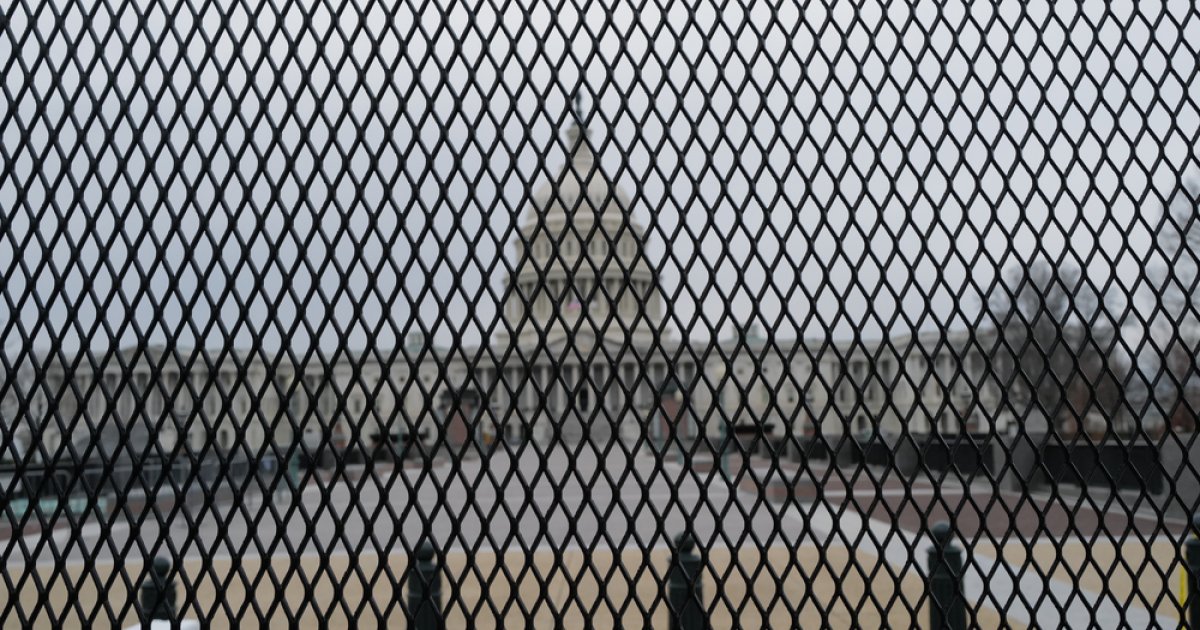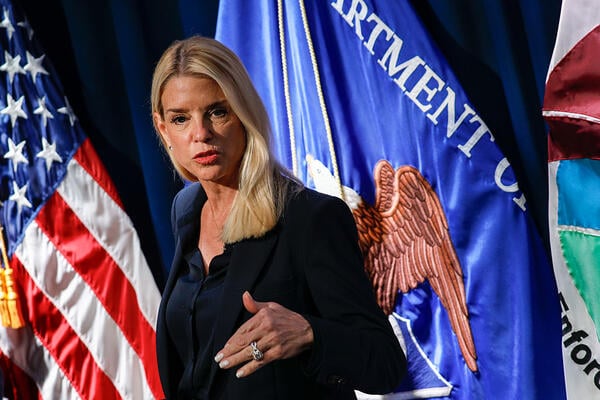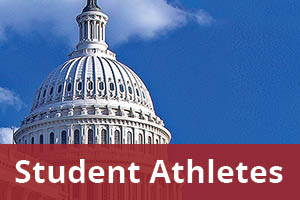On Thursday, the White House published a presidential memo — technically, a national security presidential memorandum — outlining its upcoming efforts to combat political violence.
In the wake of Charlie Kirk’s assassination, a heightened attention to political violence makes sense. But this memo doesn’t focus on actual violence. It includes frequent references to constitutionally protected speech and ideas.
While there are quite a few pieces of this order that set off alarm bells, a few of the phrases struck me as especially troubling. Here they are.
‘anti-Americanism, anti-capitalism, and anti-Christianity’
The memo says:
There are common recurrent motivations and indicia uniting this pattern of violent and terroristic activities under the umbrella of self-described “anti-fascism.” [ . . . ] Common threads animating this violent conduct include anti-Americanism, anti-capitalism, and anti-Christianity; support for the overthrow of the United States Government; extremism on migration, race, and gender; and hostility towards those who hold traditional American views on family, religion, and morality.
This is the most troubling passage in the memo, and there’s stiff competition for that title. This is the White House directly identifying beliefs, pointing the finger at them, and saying, “These are the suspicious people we need to watch.” In America, we shouldn’t target people for their ideologies. We should target them for their actions, full stop.
Recent Democratic administrations have engaged in the same guilt-by-association tactics. During the Obama administration, the IRS targeted nonprofit groups with the words “Tea Party” or “Patriots” in their names, identifying groups by ideology and punishing them by subjecting them to extra processes. And its explanation was that this was just a “shortcut” — other organizations with similar profiles had violated IRS rules, so they jumped to targeting groups that used similar words.
In 2023, the FBI distributed an internal memo linking “ethnically motivated violent extremists” to traditional Catholic ideology, a call for viewpoint-based targeting that was only exposed by a whistleblower and oversight from Congress. In 2022, an internal FBI memo linked the Gadsden flag and other patriotic symbols to violent extremism. And while such links do exist, and it makes sense for law enforcement to identify them, it also risks sweeping up ordinary Americans.
It may well be that some people who engage in politically motivated violence have anti-American beliefs, oppose the traditional family, or dislike organized religion. They should be prosecuted. And if there’s evidence of conspiracy or concrete steps toward violence, that may warrant an investigation. But we cannot start investigating other people simply because they happen to share those beliefs. Doing so would open the door to investigations of any political movement or ideology if any one of its adherents happened to engage in violence.
‘…designation as a ‘domestic terrorist organization’’
The memo also says:
[T]he Attorney General may recommend that any group or entity whose members are engaged in activities meeting the definition of “domestic terrorism” in 18 U.S.C. 2331(5) merits designation as a “domestic terrorist organization.”
Designating something a domestic terrorist organization sounds like a parallel to the process we use for identifying foreign terrorist organizations (FTO). That process was created by Congress in a statute. Being designated as an FTO triggers a number of legal effects, enabling the government to seize assets, revoke visas, bar entry of non-citizens, and prosecute people who provide any direct help to the organization. Congress has the ability to block or revoke FTO designation, and organizations themselves are entitled to judicial review of the decision to include them on a list.
There is no such process for designating a domestic terrorist organization. In fact, the “domestic terrorist organization” definition proposed here has no legal safeguards and no clear significance. It’s completely made up. It seems an organization so designated will receive extra scrutiny from the federal government until it pleases the attorney general to remove them from the list. Donors, speakers, employees, and members of these organizations will all have their speech chilled for as long as the executive branch sees fit.
It’s hard not to compare this to the Hollywood blacklist during McCarthyism. There were, in fact, real Russian spies elsewhere in America, many of them motivated by their ideological commitment to communism. Some of them were passing nuclear secrets to our rival in the middle of a nuclear arms race, the stakes of which were, potentially, catastrophic beyond all human imagination. Many people on the blacklist did have ties to communism or communist sympathies, as well. But putting people on a list because the government didn’t like their politics violated the freedoms we claimed to be protecting.
‘…politically motivated terrorist acts such as organized doxing…’
“Organized doxing” is a strange phrase.
Doxing (or doxxing) is generally defined as publishing private information that makes someone online personally identifiable. It’s also legal in most places, as long as the information was lawfully obtained and isn’t otherwise part of harassment or incitement efforts. Whether you think that’s bad or not, I don’t know that organizing the effort makes it worse. If someone posts your personal information online, your first question isn’t likely to be, “How many people were involved and what was their political purpose?”
However distasteful it might be in context, doxing is protected speech unless it violates some other existing law. After all, doxing describes much of the basic activity of news media, where otherwise unknown information is found and published, and frequently, that information is personally identifiable. That’s especially true when the “doxing” the government is upset about is information related to public employees in the course of their duties, such as the location of ICE agents.
A missive from the most powerful man in the world carries so much force that it is, inevitably, a blunt instrument. When the president uses his pen to take aim at anything, it will cause a chilling effect.
The administration itself has arguably been encouraging coordinated doxing efforts to identify people who said cruel things in the wake of Charlie Kirk’s assassination. When the vice president calls on the public to contact the employers of people who made unkind statements, and there have been groups soliciting submissions of those statements to catalog them, it would take exceptional care on the part of any future participants to avoid their efforts turning into doxing.
If organized doxing is a politically motivated terrorist act when an NGO encourages it, but it’s legal when the White House encourages it, the current administration should remember that it will be leaving that loaded gun on the desk of the next president — who may define “permissible doxing” much differently.
‘Investigate institutional and individual funders, and officers and employees of organizations…’
The memo directs that the National Joint Terrorism Task Force and its local offices shall investigate “institutional and individual funders, and officers and employees of organizations, that are responsible for, sponsor, or otherwise aid and abet the principal actors engaging in” political violence, intimidation, or obstruction of the rule of law.
To aid or abet criminal conduct requires knowledge of the conduct. To the extent officers and employees of organizations are knowingly breaking the law, I’d like to think that law enforcement is investigating them anyway. It’s been a few decades since I took criminal law, but I’m pretty sure “investigate people who know they’re breaking the law” was on the first page of the outline. Same with people who are “responsible for” it.
So what this memo is adding, then, is to investigate “institutional and individual funders” who “sponsor” the organizations that aid the principal actors engaged in political violence. That reading is also reflected in a call for the use of financial surveillance tools. It’s also consistent with a Justice Department push to investigate a group tied to billionaire investor and Democratic megadonor George Soros.
If there is evidence that a donor was knowingly funding violence, they should be investigated, but the administration hasn’t actually shown such evidence. They simply assert there is a vast conspiracy on the left — going all the way up to its highest echelons — to fund and foment political violence, and so a sprawling investigation of the president’s ideological and political opponents is justified.
We have already seen orders like this get misused
A missive from the most powerful man in the world carries so much force that it is, inevitably, a blunt instrument. When the president uses his pen to take aim at anything, it will cause a chilling effect.
For example, when President Trump issued an executive order on gender ideology that prohibited federal funding to programs that suggest gender is a spectrum, Texas A&M cancelled an annual drag show and the National Endowment for the Arts reviewed applications for their consistency with the order. Neither of these outcomes were obvious on the face of the order.
What will the overreactions to this new memo look like? Donors ending their support because they don’t want to risk an investigation? Groups being denied bank loans or leases because they’re on a government list with no way to appeal that determination? Activists going underground because they want to challenge an orthodoxy, hiding their opinions from the places where they would otherwise be challenged in the marketplace of ideas?
If this is the plan to save American values, what’s the plan to destroy them look like?





